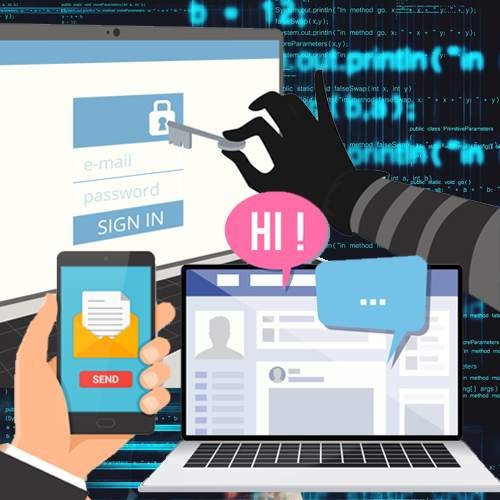In recent times the rate of hacking and hijacking social media accounts such as Facebook accounts and X (Twitter) accounts has been increasing particularly targeting well-known institutions like universities, government agencies, celebrities, and politicians across the globe particularly in less prepared societies like those in East Africa and others.
I saw this week that the East Africa University in Puntland State of Somalia Facebook page was hijacked which is unacceptable to happen to such an esteemed institution.
How these kinds of activities be prevented and why do they happen in the first place?
Social media account hacking is a major security risk with a variety of potential causes and repercussions. It’s critical to comprehend the causes of these behaviours as well as implement preventative measures:
Why do social media hacking activities happen?
There are several reasons why social media accounts are hacked or hijacked. Some of the reasons are listed below:
- Financial Gain: Hackers may try to get access to social media accounts in order to take advantage of personal data that can be utilized for financial benefit through identity theft or other forms of extortion.
- Espionage: Governments and politicians may be the target of nation-states or other organisations doing cyber-espionage, sensitive information gathering, or public opinion swaying.
- Political or Ideological Motivations: Hacktivists may attack establishments to further their political or ideological goal, voice opposition to particular laws, or reveal wrongdoing. Hacktivists are people who hack sites to expose corruption or misuse of authority etc. The famous hacktivist we all know is Julian Assange who founded WikiLeaks in 2006.
- Personal Vendettas: Sometimes someone would hack social media accounts for private motives, hoping to humiliate or harm someone’s reputation.
- Pranks: Hackers may break into accounts to have fun or to trick users.
How to Prevent Social Media Hacking:
To prevent compromise in your social media accounts and any other online account. The following advice should be adhered to.
- Use Strong Passwords: Urge users to set secure, one-of-a-kind passwords for their accounts. These passwords ought to have a mix of special characters, digits, and capital and lowercase letters. Steer clear of information that can be guessed, such as birthdays and frequent nouns. The minimum length of a password is 8 characters, and more is even better.
- 2. Enable Two-Factor Authentication (2FA): 2FA adds an extra layer of security by requiring a secondary verification method, such as a one-time code sent to a mobile device, in addition to a password.
- Regularly Update and Patch: Social media companies must upgrade their software frequently in order to address security flaws. Additionally, users ought to update their apps, computers, mobile phones and other gadgets.
- Educate Users: Users should be informed about the risks of social engineering, phishing attacks, and the importance of not sharing personal information or clicking on suspicious links. More education for the general public is needed in order to safeguard the entire digital landscape and networks.
- Monitoring and Intrusion Detection: Implement systems for monitoring unusual account activity and intrusion detection, which can help detect unauthorized access early. Many companies provide robust cybersecurity defence at a cost.
- Access Control: Restrict who has access to social media accounts, particularly for well-known people and organisations. To guarantee that only authorized people can make changes, use role-based access control, etc.
- Reporting and Response: Social media platforms should provide a straightforward way for users to report hacked accounts and offer a swift response to address the issue. Now, it’s hard for ordinary users to quickly report and resolve hacked accounts. This needs to be improved.
- Legal and Law Enforcement Actions: Laws should be in place in governments so that hackers can be prosecuted. Collaborating with law enforcement organisations can aid in locating and capturing the perpetrators and the criminals involved whatever motive they may have.
- Cybersecurity Training: Educate employees, especially those in sensitive positions, about cybersecurity best practices and the risks of social engineering attacks.
Why do these activities happen more frequently in certain regions?
Hacking activities may occur more frequently in certain regions, such as in Somalia and other East African countries, due to various factors:
- Lack of Cybersecurity Awareness: In regions with lower cybersecurity awareness like East Africa, users may not be as vigilant about their online security, making them easier targets.
- Limited Resources: Cybersecurity infrastructure and resources may be limited in those areas, making it harder to defend against cyber threats. In Somalia for example, there is no budget or resource particularly addressed to cybersecurity issues. This makes the situation dire and risk.
- Political or Socioeconomic Factors: In regions like East Africa where there is political instability and economic challenges, there might be more political or financial motivation for hacking activities to take place.
- Lack of Legal Enforcement: Weak or inadequate cybersecurity laws and enforcement mechanisms can make it easier for hackers to operate with impunity.
It is imperative to take a multifaceted approach incorporating education, technology, legal frameworks, and international collaboration to counter the increase of hacking operations in less-equipped nations. Enforcing laws, bolstering infrastructure, and raising cybersecurity knowledge are essential for discouraging hackers and safeguarding people and organisations from that risk.
Let us all work together to increase the awareness of the public, employees, students, and government workers of the risks associated with cybersecurity issues that arise and see every day.
Siyad A. Yusuf
Ogaalservice.com
